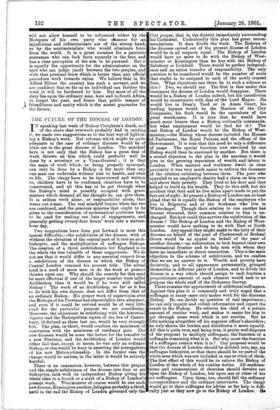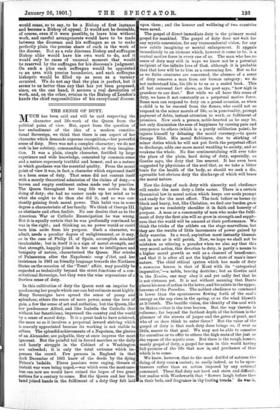THE FUTURE OF THE DIOCESE OF LONDON. T N speaking last
week of Bishop Creighton's death, and of the share that overwork probably had in causing it, we made two suggestions as to the best way of lighten- ing a Bishop's work. But reforms which might be quite adequate in the case of ordinary dioceses would be of little use in the great diocese of London. The mischief here is not only that the Bishop has a great deal of work thrown on him which could perfectly well be done by a secretary or a Vicar-General ; it is that the mass of work which, as being properly episcopal, can only be done by a Bishop is far more than any one man can undertake without risk to health, and even to life. The clergy have to be interviewed and written to, children have to be confirmed, churches have to be consecrated, and all this has to be got through when the Bishop's mind is possibly occupied with grave matters which demand all the thought he can give them. It is seldom work alone, or responsibility alone, that wears out a man. The real mischief begins when the two are combined, and the precious minutes that ought to be given to the consideration of ecclesiastical problems have to be used for making out lists of engagements, and generally getting twenty-four hours' work into a sixteen- hour day.
Two suggestions have been put forward to meet this special difficulty,—the subdivision of.the diocese, with or without the elevation of the central part of it into an arch- bishopric, and the multiplication of suffragan Bishops. The creation of a third archbishopric for England is on the whole the less valuable of these suggestions. We do not see that it would differ in any essential respect from a subdivision of the diocese in which the Bishop of Central London retained his present title: The actual need is a need of more men to do the work at present thrown upon one. Why should the remedy for this need be more effectual if one of the larger number were called Archbishop than it would be if he were still called Bishop ? The work of an Archbishop, so far as it has to do with his own diocese, does not differ from that of an ordinary Bishop. His proper work of supervision over the Bishops of his Province has almost fallen into abeyance, and even if it could be revived would be of very little avail for the particular purpose we are considering. Moreover, the objections to interfering with the historical dignity and the Metropolitan rights of the See of Canter- bury, ill-defined as these last are, would be very strongly felt. The plan, in short, would combine the maximum of innovation with the minimum of residuary gain. The new dioceses would be none the better for the transfer to a new Province, and the Archbishop of London would either feel that, except in name, he was only an ordinary Bishop, or else would be busy in asserting the prerogatives of his new Metropolitanship. In the former case the change would be useless, in the latter it would be actively hurtful.
There is no connection, however, between this project and the simple subdivision of the diocese into four or six bishoprics, each with its independent Bishop giving his whole tithe to a fourth or a sixth of a Bishop of London's present work. Westminster of course would be one such new diocese, Kensington another, Islington probably a third, until in the end the Bishop of London governed only the City proper, that is, the district immediately surrounding his Cathedral. Undoubtedly this plan - has great recom- mendations. It does divide the work. The Bishops of the dioceses carved out of the present diocese of London would be in all respects equal. The Bishop of London would have no more to do with the Bishop of West- minster or Kensington than he has with the Bishop of Salisbury or Lichfield. There would be perfect independ- ence and an entire transfer of responsibility. The only question to be considered would be the number of souls that ought to be assigned to each of the newly created Sees. What objections can there be to such a scheme as this ? Two, we should say. The first is that under this treatment the diocese of London would disappear. There would be a Bishop of London indeed, but his jurisdiction would be co-extensive with that of the Lord Mayor. He would live in Dean's Yard or in Amen Court, his leading laymen would be the Masters of the City Companies, his flock would be the caretakers of the great warehouses. It is true that he would have much more leisure than a Bishop ordinarily commands, but what employment would he find for it ? The real Bishop of London would be the Bishop of West- minster,—the Bishop whose diocese included the Houses of Parliament, the Royal Palaces, and the offices of the Government. It is true that this need be only a difference of name. The special function now exercised by one Bishop would then be exercised by another. But there is a second objection to the plan in the sanction it would give to the growing separation of wealth and labour in London. When masters and workmen dwelt in close proximity it was very much easier to enforce the closeness of the relation subsisting between them. The poor who appealed to an employer's charity had a claim on him over and above their poverty. They lived at his door and they helped to build up his wealth. They do this stilt, but the accident that they and he live miles apart tends to put the fact out of sight. At present a Bishop of London can at least plead that he is equally the Bishop of the employers who live in Belgravia and of the workmen who live in Whitechapel. Though their relation to one another has become obscured, their common relation to him is un- changed. But how could this survive the subdivision of the diocese ? The Bishop of London and the Bishop of West- minster would have nothing to do with East or North London. Any appeal they might make to the laity of their dioceses on behalf of the poor of Clerkenwell or Bethnal Green would be an appeal on behalf of the poor of another diocese,—an exhortation to look beyond their own ecclesiastical frontier and to help men with whom they have no immediate or direct connection. This is the main objection to the scheme of subdivision, and we confess that we see no answer to it. Wealth and poverty have decisively, and to all appearance permanently, grouped themselves in different parts of London, and to divide the diocese in a way which should assign to each fraction a proportionate amount of each element would task to no purpose the whole staff of the Ordnance Survey.
There remains the appointment of additional suffragans. Against this plan it is commonly and truly urged that a suffragan in many cases only makes work for the diocesan Bishop. He can decide no question of real importance; he can only inquire and collect information and report the result to the Bishop. He relieves his chief of a certain amount of routine work, and makes it easier for him to get through some work which is not routine. But he lifts nothing altogether off his superior officer's shoulders ; he only shares the burden and distributes it more equally. All this is quite true, and being true, it pretty well disposes of the proposal to multiply suffragans, the function of a suffragan remaining what it is. But why must the function of a suffragan remain what it is ? Our proposal would be that the diocese of London should be divided into, say, six suffragan bishoprics, so that there should be no part of the whole area which was not included in one or other of them. The first effect of this would be to relieve the Bishop of London of the whole of his routine duties. All confirma- tions and consecrations of churches should devolve net upon the Bishop of London, but upon one or other of his six suffragans. Upon them, too, should fall the ordinary correspondence and the ordinary interviews. The clergy would go to their suffragan for advice or for help in diffi- culty just as they now go to the Bishop of London. lb would cease, so to say, to be a Bishop of first instance and become a Bishop of appeal. It would not be desirable, of course, even if it were possible, to leave him without work, and careful arrangements would have to be made between the diocesan and. his suffragan so as to make perfectly plain the precise share of each in the work of the diocese. But as a rule diocesan Bishop and suffragan Bishop alike would have his own work to do, and it would only be cases of unusual moment that would be reserved by the suffragan for his diocesan's judgment. On such a plan each suffragan would be appointed to an area with precise boundaries, and each suffragan bishopric would be filled up as soon as a vacancy occurred. We do not say that the plan is perfect, but it seems to us better than any that has yet been proposed, since, on the one hand, it secures a real devolution of work, and, on the other, retains in the Bishop of London's hands the chief responsibilities of his exceptional diocese.



















































 Previous page
Previous page